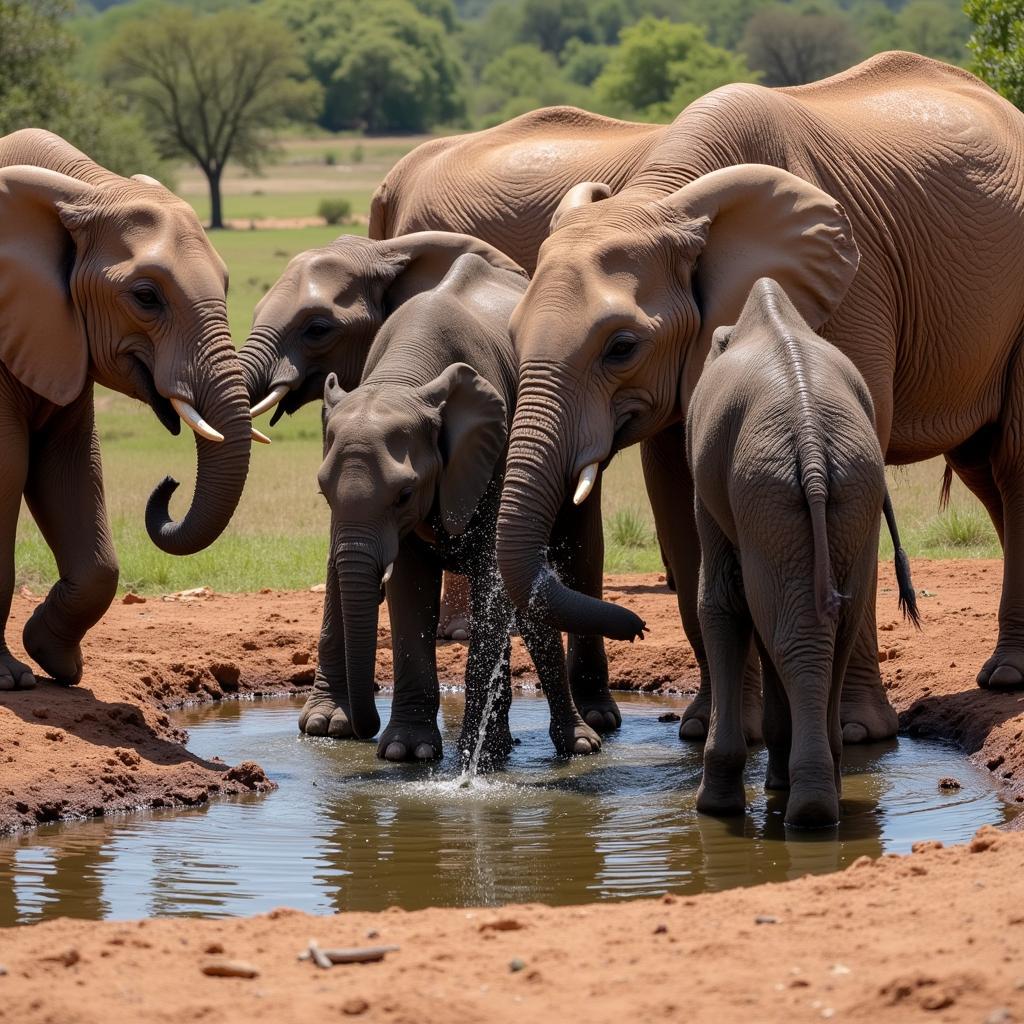African Features by Region: A Deep Dive into Cultural Diversity
Africa, the second-largest and second-most populous continent, is a vibrant tapestry of cultures, traditions, and landscapes. Its diverse regions offer a unique blend of history, art, music, food, and customs that captivate travelers and scholars alike. This article will delve into the fascinating features that define each region of Africa, taking you on an exhilarating journey through its diverse tapestry.
North Africa: A Meeting Point of Cultures
North Africa, bordered by the Mediterranean Sea, is a region where ancient civilizations have left an indelible mark on its culture and landscape. The region boasts iconic landmarks like the pyramids of Egypt, the ancient city of Volubilis in Morocco, and the Roman ruins of Leptis Magna in Libya. These historical sites stand as testaments to the region’s rich past and influence on the world.
North African Features:
- Islam: The majority of North Africa adheres to Islam, with mosques being prominent features in many cities and towns. The religion has significantly shaped the region’s social and cultural landscape, impacting art, architecture, and daily life.
- Berber Culture: The Berber people, indigenous to North Africa, have a long and rich cultural heritage. Their traditions, including their distinctive languages, music, and handicrafts, continue to thrive in various parts of the region.
- Cuisine: North African cuisine is a tantalizing blend of flavors, using spices like cumin, turmeric, and saffron. Popular dishes include couscous, tagines, and various bread varieties.
Sub-Saharan Africa: A Continent of Diversity
Sub-Saharan Africa, encompassing the vast expanse south of the Sahara Desert, is a continent brimming with cultural and linguistic diversity. The region is home to over 1,000 languages, diverse ethnic groups, and a wide array of landscapes, from lush rainforests to arid savannas.
Sub-Saharan Africa Features:
- Traditional Music and Dance: Sub-Saharan Africa is renowned for its vibrant music and dance traditions. From the rhythmic beats of drumming to the melodic sounds of the kora, each region has its unique musical expressions. These traditions are often integral to celebrations, rituals, and storytelling.
- Art and Crafts: Sub-Saharan Africa is a treasure trove of artistic expressions. From intricate wood carvings and colorful textiles to intricate masks and beadwork, the region’s art reflects its diverse cultures and beliefs.
- Wildlife and Conservation: Sub-Saharan Africa is home to an astonishing array of wildlife, including the “Big Five” – lions, elephants, rhinoceroses, leopards, and buffalo. The region’s diverse ecosystems are critical for the survival of these iconic animals.
- Oral Traditions and Storytelling: Many cultures in Sub-Saharan Africa have strong oral traditions. Stories are passed down through generations, serving as a vital means of preserving history, values, and cultural knowledge.
East Africa: Where Ancient Traditions Meet Modernity
East Africa, a region bordering the Indian Ocean, boasts a rich history and cultural heritage. Ancient civilizations like the Aksumite Kingdom in Ethiopia and the Swahili Coast have left a lasting impact on the region’s traditions and languages.
East African Features:
- Swahili Culture: Swahili, a Bantu language spoken by over 100 million people, is a unifying force in East Africa. The Swahili language, along with the Swahili culture, has influenced music, literature, and everyday life across the region.
- Wildlife and Safari Destinations: East Africa is renowned for its stunning wildlife and incredible safari destinations. The Serengeti National Park in Tanzania, the Maasai Mara in Kenya, and the Ngorongoro Crater offer breathtaking experiences for wildlife enthusiasts.
- Coffee Culture: East Africa is a major coffee-producing region, with Ethiopia being considered the birthplace of Arabica coffee. The region’s coffee culture is deeply ingrained in its daily life, with coffee ceremonies and social gatherings playing a significant role.
Central Africa: A Region of Rainforests and Vibrant Cultures
Central Africa, a region encompassing the Congo Basin and the surrounding areas, is characterized by lush rainforests, diverse ethnic groups, and a rich cultural heritage. The region is also known for its vibrant music and dance traditions.
Central African Features:
- Rainforests and Biodiversity: Central Africa boasts some of the world’s most biodiverse rainforests, with a wide range of plant and animal species, including gorillas, chimpanzees, and bonobos.
- Tribal Culture: The region is home to a diverse array of tribes, each with its unique language, customs, and traditions. Many tribes still practice traditional beliefs, ceremonies, and artistic expressions.
- Music and Dance: Central African music is characterized by its rhythmic complexity and use of polyphony. Traditional dances, often accompanied by drumming, singing, and elaborate costumes, are an integral part of social life.
Southern Africa: A Region of Landscapes and Traditions
Southern Africa, a region spanning from the Namib Desert to the Drakensberg Mountains, is home to a diverse array of landscapes and cultures. The region is also known for its rich mineral resources and its history of colonialism.
Southern Africa Features:
- Diverse Landscapes: Southern Africa boasts a variety of landscapes, ranging from the vast Kalahari Desert to the lush savannas of Kruger National Park.
- Colonial History: The region has a complex history of colonialism, which has influenced its languages, culture, and economies.
- Indigenous Languages and Cultures: Southern Africa is home to a range of indigenous languages and cultures, including the Xhosa, Zulu, and San people. Their unique traditions and languages continue to thrive in various parts of the region.
Conclusion: Embracing Africa’s Diversity
Africa, with its diverse regions, cultures, and landscapes, offers a wealth of experiences for travelers and scholars alike. Exploring its rich history, vibrant art and music, diverse culinary traditions, and fascinating customs is a journey that will leave an unforgettable mark on your soul. So, embark on your own adventure, embrace the continent’s vibrant spirit, and discover the wonders of Africa.
FAQ
Q: What are some of the most popular tourist destinations in Africa?
A: Africa offers a vast array of tourist destinations, including wildlife safaris in East and Southern Africa, historical sites in North Africa, and cultural experiences in every region.
Q: What are some of the best places to experience African music and dance?
A: Festivals and cultural events offer excellent opportunities to immerse yourself in African music and dance.
Q: What are some of the challenges facing Africa today?
A: Africa faces numerous challenges, including poverty, hunger, conflict, and climate change. These issues require sustained efforts from governments, international organizations, and individuals to address them effectively.
Q: How can I learn more about African culture?
A: There are many resources available for learning about African culture, including books, documentaries, websites, and museums. You can also connect with African communities through cultural exchange programs or by attending events celebrating African heritage.
Q: What are some of the key takeaways from this article?
A: Africa is a continent of immense diversity, with each region offering a unique blend of history, culture, and landscapes. Embracing this diversity is essential for understanding the continent’s rich heritage and its role in the world.

